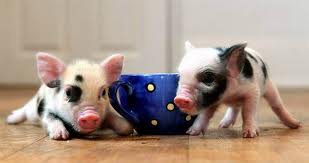No doubt, you’ve probably heard about the growing worldwide pet craze made even more sensational
when fashionable trendsetter heiress, Paris Hilton had her picture taken with her Teacup Pig
accessorized to her own fancy. Well, you cannot expect to have the Paris Hilton kind of Teacup Pig that
she can put in her cup or purse because, the pig did grow up big weighing about 50 pounds in a couple
of years! Go ahead and you can Google it… her pig has become big enough to be called just “pig.”
Also referred to as “pocket pigs”, mini potbelly pigs”, “dandie pigs”, “micro pigs” and “mini pigs”, these
pigs are called these names basically because of its size. The term “teacup” actually refers to the size
and not the type of pig. It is just one and the same pig.
If you are considering a tea-cup pig as pet or perhaps your daughter has been begging you for years to
have one, better do some homework before having this one as a domestic pet. Is a teacup pig a pet that
might be a good fit for your family? Read on for some pros and cons and common misconceptions about
this interesting little teacup creature.
First, know where it comes from. Miniature pigs were used as part of a medical research for toxicology,
pharmacology and aging in Europe before it was introduced to the United States as a pet during the
1980’s. Although they can be house-trained and incredibly friendly, there is no guarantee that the
teacup pig will live up to its name – stay the same size forever. This is because they are not a breed
of pig. They just remain smaller because of its breeding process when the smallest pig from a litter is
bred to the runt of another which, in effect, produced the same small size of both parents. These are
miniature potbelly pigs that do not exactly grow as large as a regular potbelly but can still get over 200
pounds in 2-3 years! Take note, they teacup pigs do not end up teapots, they grow bigger.
Second, be ready for the responsibility. Pigs will always be pigs. Yes, they can be toilet-trained but there
is no guarantee that they stay clean most of the time. They may be clean but their surrounding area may
not be. The pig’s water, food and litter pan must be thoroughly washed at most two to three times a
day- indeed a demanding daily task… are you ready for it?
Third, aside from the pricy tag that can go as high as $1000 each, these teacup pigs would also require
time with a life span of 20 to 30 years –are you willing to co-exist with one? They also need designated
area for it to move around. They need to be played with and exercised requiring a much bigger space,
something like the zoning of a mini farm.
Tea-Cup Pig Video
















No comments:
Post a Comment